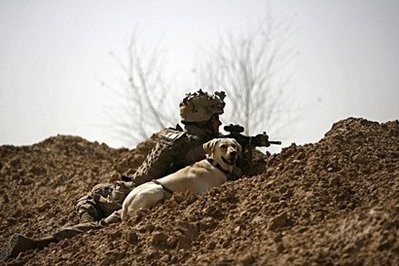Afghan troops raised their flag over a badly damaged market in the Taliban stronghold of Marjah on Wednesday as Washington said a major offensive to take control of the town was "going well".
The ceremony provided a symbolic boost in one of the biggest offensives since the US-led invasion of Afghanistan in 2001 as Afghan and Western forces reportedly came under fire from Taliban fighters hiding behind human shields.
White House spokesman Robert Gibbs quoted an up-beat assessment by General Stanley McChrystal after the US military chief briefed President Barack Obama's war cabinet via video link.
"The response that we got from General McChrystal today was that the operation was going well... because of the time that had been taken to shape it with local authorities," Gibbs said, adding that "extra caution" was being taken to avoid civilian casualties.

Gibbs also hailed the arrest in neighbouring Pakistan of top Taliban military commander Mullah Abdul Ghani Baradar as a "big success" for collaboration on security.
The bazaar in Marjah was a forlorn sight -- shops and buildings were badly damaged from fighting and barbed wire sealed off roads believed to be heavily mined.
Drug lords and the Taliban have controlled the region in the southern province of Helmand for years.
"People have come out of their homes and into a desert, without any food or water. We are living in very hard conditions," resident Abdul Rashid said.
As provincial governor Mohammad Gulab Mangal toured the battle-scarred terrain, an Afghan soldier raised the red, black and green Afghan flag over the battered market, shouting "Allahu Akbar" (God is greater).
But Mangal joined Afghan commanders in saying it was too early to declare Marjah "cleared" completely of militants or their mines.
"From the military point of view, one cannot set an exact timeline but work to clear mines continues," he said.
NATO said two more of its soldiers had been killed in Operation Mushtarak (Together), bringing to six the total number of foreign soldiers killed in the offensive since it started on Saturday.
An Afghan interior ministry spokesman, Zemerai Bashari, said about 1,100 Afghan police were deployed in Marjah as part of plans to set up a civilian administration.
Amnesty International says up to 10,000 people have fled the conflict area and thousands more remain trapped by the fighting.
"There was fighting, planes were flying overhead all the time, there were tanks all over the place, bullets were hitting our houses," Wali Jan told the BBC, saying he had left Helmand for the neighbouring province of Nimroz.
"Where we are staying is just shelter, nothing more -- no gas, no blankets, no flour and no food. We are all sick but there is no transport to get to anywhere where there is help," he said.
The top Afghan general commanding Operation Mushtarak accused the Taliban of hiding behind human shields.
"They have taken people hostage. Our troops have seen them putting women and children on the roofs of houses and firing from behind them," said General Moheedin Ghori, commander of the 4,400 Afghan troops taking part.
"We have strict orders not to fire at civilian areas."
A Taliban spokesman denied their fighters were exploiting civilians.
"We have never used civilians as human shields, we do not use our own people as human shields," Yousuf Ahmadi told AFP by telephone from an undisclosed location. "We are there, standing against the invaders in direct fighting."
Afghan and British soldiers sweeping through villages in the Nad Ali area, where Marjah is located, found bombs buried by roadsides, in fields, hanging from trees, even embedded in walls, an Afghan army colonel said this week.
In a battle update Wednesday, NATO acknowledged Taliban resilience, calling the insurgents "tactically adept" and "cunning."
"Mining is significant in areas and the combined force must be very deliberate in its movement in order to minimise local Afghan and combined force casualties," it added.
Mangal said Taliban deaths had risen to 40. Twelve civilians have been reported killed in the battle.






)

















